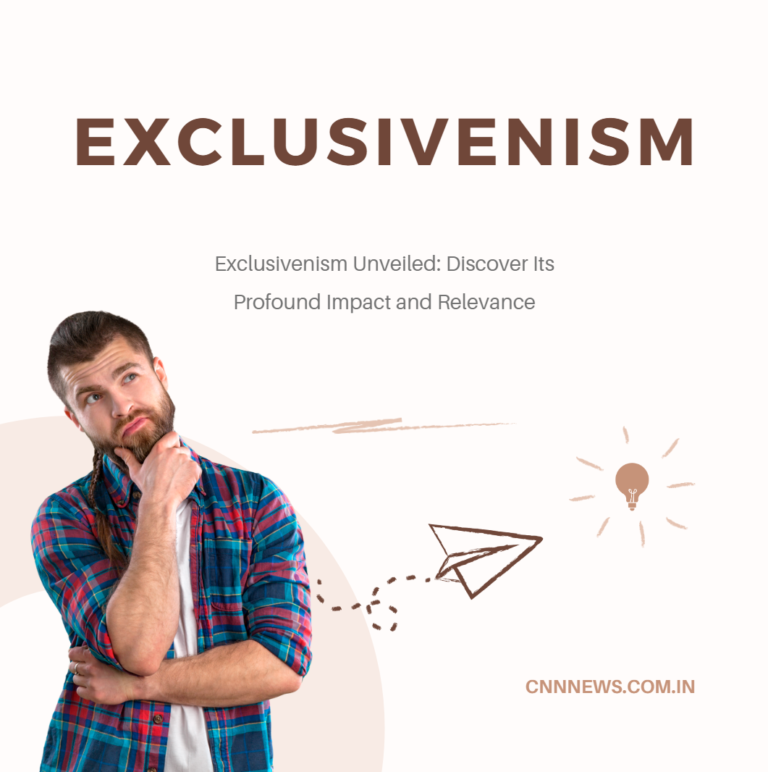Exclusivenism is a relatively new term gaining traction in various discussions, from social interactions to business strategies. But what exactly does it mean, and why should you care? In this article, we’ll unpack the meaning of exclusivenism, explore its implications, and examine why it might be relevant in today’s world.
Table of Contents
What is Exclusivenism?
It refers to the practice or mindset of creating a sense of exclusivity around a group, product, or idea. It’s the “members-only” sign at the door, the VIP section in a nightclub, or a limited-edition product that’s available for just a select few. At its core, It is about defining who is in and who is out. But it’s more than just about exclusion; it’s about creating a sense of belonging for those who are “in” and a sense of desirability for those who are not.

Exclusivenism in Society
In society, It can manifest in numerous ways. It can be as subtle as social circles or as overt as access to elite schools and clubs. Have you ever noticed how certain social groups seem impossible to break into? That’s It at play. It’s often driven by the desire to maintain a particular image, status, or identity.
It isn’t just a social phenomenon; it’s also a tool of power. Those who control access to the “exclusive” resources, ideas, or communities often wield significant influence. This is why understanding exclusivenism is crucial—it shapes not only social interactions but also power dynamics within societies.
Exclusivenism vs. Inclusion
You might be wondering: isn’t It the opposite of inclusion? Yes and no. While inclusion is about bringing everyone in, It is about filtering some people out. It’s like having an invitation-only event versus a community festival open to the public.
The Role of It in Business
It has a powerful role in business strategies. Think about high-end brands like Rolex or Hermès. Part of their appeal lies in their exclusivity—the idea that not everyone can own a piece. This creates a strong desire among consumers to be part of that exclusive group.
Exclusivenism in Marketing
In marketing, It is used to create buzz and excitement. Terms like “limited availability,” “exclusive offer,” or “by invitation only” are designed to make potential customers feel like they’re getting something special. It’s like getting a golden ticket to a private event—suddenly, everyone wants in!
Is It Always Negative?
Not necessarily. It can foster a strong sense of identity and belonging for those who are “in.” It can also create aspirational goals for those who want to be part of the group. However, it becomes problematic when it perpetuates inequality, exclusion, or elitism.
How It Shapes Communities
Communities are often shaped by inclusivity and exclusiveness. Think about gated communities, private clubs, or even online forums. The more exclusive they are, the more tightly-knit the group becomes. However, this can also mean that those who are outside feel disconnected or even hostile towards the community.
The Psychological Impact
On a psychological level, exclusivenism can significantly impact individuals’ self-esteem and identity. Being part of an exclusive group can boost a person’s sense of self-worth and belonging. However, being left out can have the opposite effect, leading to feelings of rejection and inadequacy.
Combating Exclusivenism
So, how do we combat the negative aspects of exclusivenism? One way is through fostering inclusive practices. Encouraging open communication, embracing diversity, and creating multiple avenues for participation can help reduce the harmful effects of exclusiveness.
Conclusion
Exclusivenism is a complex concept that impacts various areas of life, from social interactions to business strategies. While it can create value and a sense of belonging, it can also perpetuate division and inequality. Understanding how to balance exclusivity with inclusivity is key to leveraging its benefits without falling into its traps.

[…] Explained: A Deep Dive into Its Features and Benefits Exclusivenism: A Deep Dive into an Emerging Concept October 1, […]
[…] its core, It refers to an innovative concept that has emerged as a breakthrough in various fields. Whether it’s technology, education, or even entertainment, […]